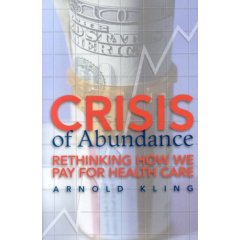
I'm going to try to "liveblog" Arnold Kling's new book "Crisis of Abundance: Rethinking How We Pay For Health Care." Dr. Kling is the scary-smart co-proprietor of the Econlog blog and a former Federal Reserve Economist.
In my prior experiment in bookblogging I read "Chasing Daylight," a memoir of a prominent accountant's battle with terminal brain cancer. I just read and blogged my impressions as I went.
I'm going to do this a little differently. I will write down my current views of the U.S. healthcare system before I start. As I read I will try to note items that confirm or contradict my current opinions, and whether and how my views change.
WHERE I START: MY CURRENT VIEWS ON THE U.S. HEALTH SYSTEM
I am perplexed by the rising cost of health insurance and health care, yet I am aware that the health care we get is better than it ever has been. I see several big, related issues in health care:
1. Why is health care so expensive, and why does the cost go up so fast?
I think this comes from a combination of causes. The tax-favored status of health insurance is part of the problem. The tax law encourages employers to compensate workers in health care instead of cash. This has led to systems where employees are largely insulated from the costs of their health care. An 300-lb employee who goes home and eats Cheetos, drinks beer and smokes cigarettes in front of the television pays the same for health insurance as a 160-lb marathoner in the next cubicle.
The prevalence of low insurance deductibles and co-pays also makes it easy to run up larger bills. Why not, if the insurance company covers it? If people were spending their own money, they'd likely spend less of it.
The medical malpractice legal system increases health care costs, both directly by siphoning cash off to second-guessing plaintiffs lawyers and by encouraging doctors to run extra tests to cover their butts.
Finally, health care is about life and death. If spending a few more bucks will extend life, ease pain, or improve quality of life, people will spend them. If it's the insurance company paying the bills, they'll spend quicker. They will also opt for expensive new technology. The latest technology is often the most expensive. That's why the fancy stereo stores will have $10,000 home theater systems that will be available at Best Buy in five years for maybe $800. Most people sensibly opt for Best Buy. But when the latest technology gives you continued existence, rather than higher fidelity sound reproduction, everybody wants the high-end product.
2. What, if anything, should be done to moderate health costs?
If I were the Tax King, I would strike all health care benefits from the tax law, and I would persuade the Health King to eliminate all coverage mandates and allow insurance companies to market whatever policies they care to offer nationwide on the internet. As the job doesn't seem to be open, I have to accept that the tax law is likely to be involved. I would limit tax benefits to high-deductible plans and expand health savings accounts to allow people to build a nest egg to fund health insurance reserves. I might even have a refundable credit for contributions to HSAs by low-income taxpayers, if we get rid of all other personal credits.
It seems clear that additional government involvement isn't the answer. Canada, with its waiting lists, substandard facilities and doctor shortages, testifies to that.
3. How does health insurance fit into the health care system?
Beats me. One possibility is to require everyone to buy health insurance, just like they do with car insurance. This bothers me; I could be damaged financially if somebody hits my car, but it's no money out of my pocket if somebody else needs back surgery. Should he be required to be prudent and buy insurance anyway?
In any case, "insurance" doesn't mean that Blue Cross pays all your health bills, to me. It means a plan that covers unexpected big bills that would otherwise be financially painful or ruinous. Ruin means different things for different people, but few will be ruined by going out of pocket for $1,000 per year, and many find even $5,000 per year to be about the difference between trim package for their new SUV. Also, a larger deductible will largely come back to the insured through lower premiums.
I think the the real issue with health insurance is...
4. How should we deal with health care for the poor?
If a middle-income person chooses not to buy health insurance and gets hammered with big bills, he pays the consequences of taking a risk with his eyes open; that's his problem. If a poor person is bankrupted by health costs because there was no affordable insurance available, that seems like a different matter. But what is "affordable," and how much should people be expected to pay? And if they can't pay, who picks up the tab? It doesn't grow on trees. Maybe the current system, where it gets picked up indirectly through higher costs on those who can pay, is the worst system except for all the others.
My opinions come from my experience as an employer, a tax practitioner, and a heath care buyer. Many smart people know a lot more about health economics than I do, and I'm sure Arnold Kling is one of them. I look forward to seeing what he has to say.
No comments:
Post a Comment